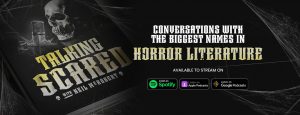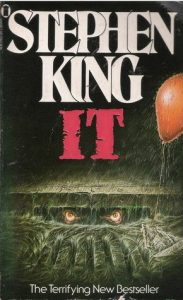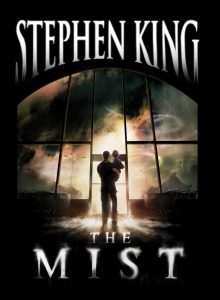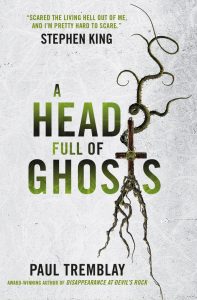I pleased to bring you an interview with Neil McRobert this week. Neil is the host of one of, if not the best podcasts on horror fiction. It’s my go to listen each week, with Neil interviewing the great and the good of horror fiction, with the likes of Max Brooks, Grady Hendrix, Josh Malerman, Carman Maria Machado, Eric LaRocca and Joe R. Lansdale. Neil is such an insightful interviewer asking far from stock questions. He is passionate about horror and gothic fiction, so much so he did a PhD on it. And Neil is also an aspiring novelist, currently working on his first book. So lets get into it, because for me this is one of the best interviews so far.
Tell us about you podcast Talking Scared?
Talking Scared is a podcast of conversations with the biggest (or soon-to-be-huge) names in horror writing. We delve into the inspirations behind the books, the creative process, the author’s thoughts on the genre, and anything else that we stumble across in our rambling. New episodes every Wednesday.
 Your podcast is a brilliant show interviewing the cream of horror writers. How and why did you start it, and how do you get such amazing guests?
Your podcast is a brilliant show interviewing the cream of horror writers. How and why did you start it, and how do you get such amazing guests?
Well thanks for pointing out the calibre of guests. I am genuinely proud of the authors that have agreed to come on the show. To be honest, and hopefully without sounding too smug, I’m amazed by how straightforward it has been to get some of these stellar names onboard. It turns out writers love the chance to talk about their work, and my aim is always to offer them plenty of room to get into things they may not be asked in every other interview.
In purely practical terms, though, it started because I quit my job in the pandemic and wanted something that would give me the satisfaction of hard graft and creativity. I’d been lucky enough to interview Paul Tremblay previously, so I reached out to him as the first possible guest. When he said yes, I had that in the locker to augment my approach to other publicists and authors, and then it just snowballed. Professionalism, politeness and a genuine enthusiasm for the books certainly helps.
I think you are one of the best literary interviewers around. Do you have a method for preparing for interviews?
Again, thanks very much man! I have done 40+ episodes now, so I’ve had chance to refine the preparation. Number 1 is that I insist on the time to read the book properly. I’m convinced that a lot of the BIG lit-interviewers out there either aren’t reading the book, or are getting their assistants to do it for them and then interviewing on the notes. Maybe i’m wrong, but who knows.
Then I identify a central them that I want to structure the conversation around. This could be genre, or character or politics or violence – recently I interviewed Chuck Wendig for a forthcoming episode and the entire conversation hinged on the topic of empathy. Once you have that anchor it’s easier to predict and prepare for the arc of a conversation. But I try and leave plenty of room for ad-libs and unexpected avenues.
Also, read all the other interviews with the author and try to do better, or at least be different.
Has Talking Scared influenced your writing in any way?
Massively. In the early days of the podcast I asked each author for a piece of advice for fledgling writers. I stopped after the answers became too similar, but they are similar for good reason. I’ve learned not to fixate too much on the word-by-word writing, and to let the story emerge. And I’ve also really embraced the persistent idea of writing for yourself, not the market.
We have a similar route to writing, in that we both wrote PhDs first and seem to have transitioned into horror fiction. How did that Kafka-eque metamorphosis happen to you?
Ha! It just turned out I’m too lazy for academia.
In seriousness, my PhD was a bit of a car-crash. Not in terms of the work – I’m proud of my thesis, even if it does read as somewhat incomprehensible now I’m outside that headspace. I was quite let down by the institution and didn’t have the support I needed to segue into an academic career. And then you spend a lot of time putting your life on hold thinking “no point getting settled her ‘cos I may have to move to [insert university town] at any moment if I get a job”. I met my wife-to-be and realised that though I love the research, and adore the Gothic studies community (great people, crazy conferences!) I just didn’t love the work enough to keep my life in abeyance. So I got a ‘real’ job, discovered I hated that too and then thought, fuck it – the world is ending, let’s at least have a go at writing a novel before we’re all eating each other.
What do you think the appeal of horror and gothic fiction (because I know you love it) is?
Oh, that’s a huge question with as many answers as a Lovecraftian abomination has tentacles. The simplest answer is that I think humanity is hard-wired to questions the why of life, not just the how. For millennia that has been the basis of religion, and it’s no coincidence that horror and gothic work in tandem with, or have been birthed from religious thought. In the new, secular order of things, I think horror persists as a way to look beyond the mortal and rational veil and to ask the really fundamental questions about humanity and the world, in the raw. As a committed atheist myself, I can still see how horror allows me some access to (for want of a better word) the spiritual. Actually, I have a better word. The numinous.
All that plus monsters are cool, vampires are sexy, and zombies are fun to kill.
If you could co-author a book with another author, alive or dead? Who would it be and what would it be about?

This isn’t a novel answer. Stephen King. The man helped raise me. I can’t stress enough his impact on my life. I quite simply would not be the person I am today without his writing (and, to a lesser extent, the music of Bruce Springsteen). I only hope one day to meet him, shake his hand and tell him that he means so very much to me.
Ahem – wipes away tear.
If we wrote a book together it would be a prequel, of sorts, to IT. Looking back into early history and further developing the mythology surrounding Pennywise’s hold on the land, and his interactions with early settlers. That’s the book I want to read more than any other.
What does your writing routine look like?
Routine? Ha. I have a puppy and there’s a pandemic on. I get up, pretend I’m going to write in earnest then spend the day buggering about on twitter before dashing down a 1000 words in a blind panic at some point the afternoon. An hour of self loathing followed by the insistence that I will do better tomorrow.
Repeat Mon-Sat
What’s the hardest thing about writing a novel?
You know more than me Dan; you seem to finish one every other week.
As I’m only two-thirds through my first attempt, I can only say what I have learned thus far. The hardest thing is keeping track of the story, the timelines, the inconsistencies, the little details that don’t seem to mean much but which derail you if you suddenly see them. I’ve written plenty of short fiction and though that has its own challenges, the novel is an intricate, unforgiving beast.
Dan: In my experience the first one is the hardest. Scratch that. I wrote two novels just to find out how to write a novel, with no intention of publishing them. Then I half-wrote one that was missing something. Then on the fourth try, I wrote Neolithica. Each one after that has been a challenge – it’s supposed to be hard, but I’m armed with the experience that I’ve done it before. Also, you waste less cognitive effort of certain things and have more to put into just keeping the writing coming. Or that’s what I’ve found, at least.
First line throw down. I give you a first line; you finish the opening paragraph of a story:
Cats can’t speak: John knew this was true and yet Genghis the ginger tomcat had taken a break only to lick his own arse.
It was hard to believe that sandpaper tongue could shape such silken words but, ablutions completed, Genghis looked up at his owner (though, could one really own a cat capable of philosophical discourse?) and enquired when Simone would be home.
“I don’t know,” John stammered.
“You know she’s being unfaithful to you?”
John said nothing, as shocked by the allegation as he was by the creature casting it.
“I say we kill her.” Genghis purred.
Dan: I love it. That’s exactly what a cat would say.
What’s the best horror book and movie adaptation duo and why?
My knee-jerk reaction is always Rosemary’s Baby, but in truth the adaptation is so close to the book that it’s almost redundant. Both film and book are fantastic, but you only need one.
In terms of pairing, I’d say The Mist because it adheres enough to the source material to not feel disrespectful or like it’s lost its way. But it differs enough to pack a punch. If you have seen it, you know what I’m talking about.
feel disrespectful or like it’s lost its way. But it differs enough to pack a punch. If you have seen it, you know what I’m talking about.
It’s probably not the best King adaptation – that would be Misery. (Don’t start with The Shining, I loathe Kubrick’s movie with the a burning, incessant hate). But it is the one that plays with the source material in the most interesting way,.
What’s the first horror novel you remember reading? What impression did it make on you?
I genuinely think it was IT. And the impression is too profound to put into words. It literally shaped the kind of storyteller I want to be, and it left me with this gaping hole that no book has quite managed to fill in the years since, though Swan Song, The Stand and Lonesome Dove have come closest.
There is a particular beauty in that book -poised somewhere between fantasy and
…sorry, I get emotional.
What’s your favourite horror short story and why?
Well Shirley Jackson’s “The Lottery” takes some beating, and King’s “The Man in the Black Suit”, oh and Joe Hill’s “The Black Telephone.” All great.
But here’s something a little more obscure. Brian Hodge’s “West of Matamoros, North of Hell”. I read it in Ellen Datlow’s Best Horror of the Year from a few years back and it blew my mind. It’s a story of some ignorant American kids who get sucked into the world of the narcocartels and the REALLY nasty shit that goes on. I recall reading in a coffee shop on my honeymoon and telling my wife that I’d never read a story like it. It’s so awful it genuinely makes you want to pull your eyes from the page, yet you read on, fascinated and sickened. It’s a fabulous story and I tell everyone I can about it.
If you could only read three horror novels to make you a better writer, which three would you pick and why?
 Paul Tremblay’s A Head Full of Ghosts teaches how to be scary even when nothing is happening.
Paul Tremblay’s A Head Full of Ghosts teaches how to be scary even when nothing is happening.
Sarah Waters’ The Little Stranger is quite simply the greatest ghost story I’ve ever read – and it is a masterclass in offering alternative readings without making it obvious you are doing so.
Stephen King’s IT (or The Stand) teaches you that the most important part of horror is not the nasty stuff, it’s the lovely, beautiful, brave stuff that happens in between the islands of violence and awfulness. The sweet that makes the salt burn.
You are a prolific reader. What’s the best book you read this year so far?
Easy. The Last Thing to Burn by Will Dean. It’s the best book I’ve read in a long time.
Which monster from fiction – books, TV or film – would you most like to be and why?.
Ha, interesting question. Does Wolf from The Talisman count as a monster? He is, after all, a werewolf, but of the loveliest disposition. Yeah I’d be Wolf, and you can be the herd.
What’s your spookiest life experience?
It pains me to say that I haven’t had anything spooky happen to me. Bloody let down. But let me tell you about my mum – a woman with no time or inclination towards the supernatural at all. She’s laugh if you told her you’d seen a ghost. But… but…
She was a nurse in a psychiatric hospital back in the 70s. At the time it was an old institution – barely changed from the Victorian era. My mum and her colleague were charged with cleaning the secure unit, where the most dangerous patients were housed. So, you have to understand the technicalities of this. To get to the ward in question required unlocking a door, and locking it behind you, doing the same with the next door, climbin a flight of stairs and unlocking/locking a third door.
The ward was already emptied of course, but to check, the nurses would open all eight doors in one go, checking each room to ensure they were empty. They would then clean each room in turn, closing the doors as they go – got me.
So, my mum does this, sees that no one is up there, and they set about cleaning the first room. At which point all the doors slam in sequence and they can hear running feet. They go out of the room, and find no-one there, check each room again, plus the locked exit and find no-one. They obviously retreat nervously, but put it down as one of those weird things.
Cut to years later. At which point my mum is a senior nurse. Some workmen are removing asbestos from the locked ward (shades of Session 9 anyone?) and a big burly member of the removal team comes up to my mum demanding to know what’s going on.
What do you mean, she asked?
There’s an old lady running all around the place up there, workman says.
Of course, the ward had been emptied of all patients and locked tight well in advance.
Who knows….
Dan: This one is up there with Bethany Clift’s story.
What does the next year of writing and publishing look like for you?
Well I need to go back to work and earn some money – unless the podcast Patreon takes off (hint, hint everyone). So my output will probably slow down. But I’m hoping to continue the podcast as best I can, and to finish the first draft of this story by the end of summer. Rewrites and edits in the autumn and then start trying to interest agents in the new year.
Have you got a newsletter/reader magnet?
I have not. The next phase of my bid for world domination is a website for Talking Scared. I need to enlist my techno-savvy brother-in-law for that ‘cos god knows how anyone gets a site built on WordPress themselves. I tried for about thirty minutes and then had to flee my computer.
But once that’s up and running I’ll have a newsletter for sure.
Where can people stalk you online like a serial killer?
You can find me most frequently on twitter @talkscaredpod – I lurk there pretty much all day.
Instagram is talking_scared_pod – though Instagram is such a pain in the arse.
You can email me direct at talkingscaredpod@gmail.com – and please do. I respond to all emails.
Lastly, my Patreon is www.patreon.com/talkingscaredpod – and genuinely, all support is wholeheartedly appreciated. It’s a hard, cold digital world out there and anyone who takes the time to tip their waiters is a good person in my book.
Is there anything else you’d like to add?
Just to reiterate how grateful I am for all support, whether it comes as donations, platforming, signal boosting (god social media jargon is painful!) or just by listening. I started this show thinking it would help pass the time during a global pandemic and now it is the most dominant, rewarding thing in my life – and I’m just thrilled to pieces that people seem to like it. It never gets old. So from the bottom of my dark, withered heart, thanks!


